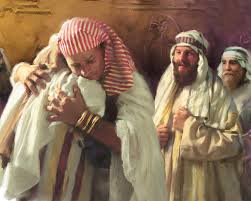The Torah spends much time describing the events and life stories of the original forefathers of our people. Each event and life story become the prototype of future events in the plan of destiny of their descendants. “What was” becomes the picture of “what will be”. In the words of the Ramban, “Maaseh Avot Siman LeBanim” (Ramban ; Genesis 12:6), the actions of the forefathers become signposts for their children in their own journey.
It is important to view these events in their global meaning and purpose. It does a disservice to try to understand the events affecting these great spiritual leaders in simple psychological and emotion based terminology.
On the other hand G-d is clearly using mortal men to create the backdrop and prototypes of His plan of destiny. Exploring these areas will also provide great insights into the passions and drives that affect us all.
Joseph was separated from his family for over 22 years. He began his life in Egypt as a slave and rose to prominence as the Viceroy of Egypt. Yet even after achieving this great peak in his life he does not do what we would have expected him to do. He does not contact his father. We need to understand why?
Our sages offer a wide spectrum of thoughts on this question.
The Ramban and the Netziv understand that Joseph knew that his dreams were going to be fulfilled. They posit the possibility that he refrained from contacting his father in order for the development and unfolding of his prophetic dream to actually occur.
There are others like the “Rosh” who maintain that Joseph knew that if he contacted his father and recounts his story the pit and of being sold to slavery it would destroy the family.
Others such as Rav Yoel Bin Nun suggests that Joseph couldn’t be sure that his father did not already know of the events around his disappearance and captivity. It may be true as well that Jacob may have been in agreement with these actions. The history of this family has included siblings being ejected from the family collective. In Abraham’s family we read of Ishmael’s being sent away. In Isaac’s family we read of Esau separating from his family as well. Perhaps this same pattern was to recur with the children of Rachel, Joseph and Benjamin as well . This would help to explain why Joseph “needed” to have Benjamin brought to him . He may have seen it as a way of rescuing him from the dangers he experienced.
Yet the text of Judah’s speech to Joseph and Joseph’s reaction to it may indicate another possibility.
Joseph knew that his father had loved him dearly. Yet over the last 22 years, Joseph was painfully aware that Jacob never made any efforts to discover his whereabouts.
As strong willed and faithful as Joseph may have been, this possibility of being abandoned by his father was unbearable. The fear of being unloved ripped through his soul. It is the pain of that feeling of perhaps being unloved that gave him the will to play out his rule with his brothers with relative calm and steely determination. It also may explain why he did not reach out to his father, fearing the ultimate rejection.
Yet something about Judah’s words to him broke that steel wall.
“Then Judah approached him and said, “Please, my lord, let now your servant speak something into my lord’s ears, and let not your wrath be kindled against your servant, for you are like Pharaoh. My lord asked his servants, saying, ‘Have you a father or a brother?’ And we said to my lord, ‘We have an old father and a young child of his old age, and his brother is dead, and he is left alone of his mother, and his father loves him.” (Genesis 44:18-19 )
Joseph is told for the first time that Jacob believed that he was dead. This realization becomes reinforced by what he is told next.
Judah describes the pain that his father suffered on hearing that in order to purchase more food that would have to come back with Benjamin, Joseph’s younger brother.
“And your servant, my father, said to us, ‘You know that my wife bore me two [children]. The one went away from me, and I said, “He has surely been torn to pieces, and I have not seen him since. “Now if you take this one too away from me, and misfortune befalls him, you will bring down my hoary head in misery to the grave.’ And now, when I come to your servant, my father, and the boy is not with us [since] his soul is attached to his (the boy’s) soul, ( ibid :27-30) .
At this point Joseph begins to understand the depth of the pain and love that Jacob has for Benjamin and by extension for him as well.
Judah goes a step further when he offers to sacrifice his own freedom for the sake of his brother Benjamin;
So now, please let your servant stay instead of the boy as a slave to my lord, and may the boy go up with his brothers. (ibid:33)
It is at this point that Joseph breaks down and declares to the brothers “I am Joseph. Is my father still alive?” ( ibid 45:3)
What exactly was Joseph asking about his father in the midst of his painful cry? Some view the words as a reproach. “Is my father still alive” even after what you brothers put him through with the lie about my death? “But his brothers could not answer him because they were startled by his presence.(ibid)
Yet perhaps there was another deeper level to his question. After years of feeling unloved and abandoned he blurts out “. Is my father still alive”. Can it be that my father is still my father?
When he finally meets his father we read the following;
And Joseph harnessed his chariot, and he went up to meet Israel his father, to Goshen, and he appeared to him, and he fell on his neck, and he wept on his neck for a long time.( ibid 46:29)
Clearly the encounter of Jacob and Joseph had great spiritual implications for the future of their descendants. Yet the building blocks of that dramatic story consists of emotions and passions. Love is a powerful force. The fears of feeling unloved can be just as powerful while at the same time crippling as well.
May we be aware of the power of love as it can fix the world .The spiritual dimension of the world was fractured by ultimately baseless hatred. It will be repaired by baseless, unconditional love.
LeRefuat Yehudit bat Golda Yocheved

